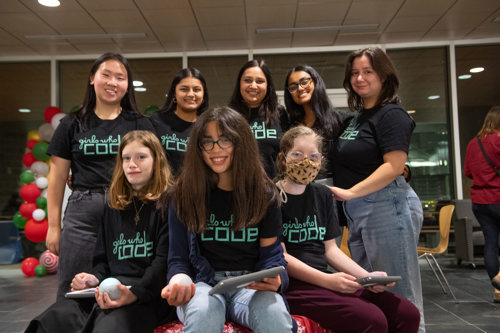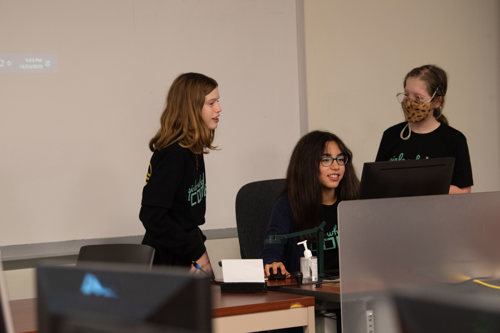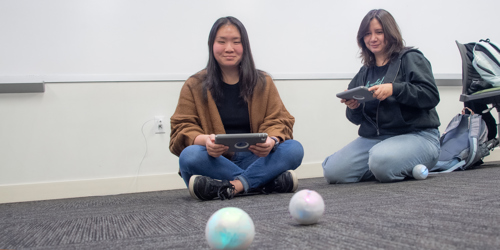 As a sophomore computer science major, Alyson Collins learns something new in the Romain College of Business every day. But thanks to a special opportunity, she’s getting the chance to spread knowledge to the next generation of computer scientists and programmers.
As a sophomore computer science major, Alyson Collins learns something new in the Romain College of Business every day. But thanks to a special opportunity, she’s getting the chance to spread knowledge to the next generation of computer scientists and programmers.
Collins, from Robinson, Illinois, is one of four computer science students who is helping to lead the University of Southern Indiana’s Girls Who Code club. Girls Who Code is an international organization that aims to support and increase the number of women in computer science. USI’s club meets weekly from 5:30 to 6:30 p.m. on Wednesdays and is open to any female middle school and/or high school students.
“When you teach them how to run a basic code such as Hello World, you can see their eyes kind of in awe thinking – ‘I just did that’,” said Collins, who is also the President of USI’s Association for Computing Machinery chapter. “You can really see it click in their heads that they can do this.”
USI’s Girls Who Code club was first started in the Fall of 2018 under the direction of faculty advisor Dr. Srishti Srivastava, Associate Professor and Program Coordinator of Computer Science. However, due to the COVID-19 pandemic, the club became dormant until it was revived at the beginning of the 2023 Fall Semester. The Girls Who Code national organization was founded as a small club by Reshma Saujani in 2012 and has now grown to more than 580,000 members worldwide.
According to the Girls Who Code website, their mission is “to close the gender gap in technology and change the image of what a programmer looks like and does.” For Srivastava, that was an important part of rejuvenating the club and making sure young girls were aware that they, too, can become computer scientists in the future.
“As a student, I was the only woman in computer science courses,” Srivastava said. “Girls Who Code has done a lot of research that shows the problem starts at middle school age. That’s when girls are diverted toward other fields because they feel this particular STEM field isn’t for them. They don’t see the creative side to it because of the stereotypes associated with the field. That’s why I wanted to do a chapter here.”
 During the Fall Semester, Girls Who Code worked with middle school girls only but will open the weekly meetings up to girls in both middle and high school this Spring. Each meeting starts with a female spotlight, highlighting a woman involved with either computer science or programming. After that, the girls build coding skills and learn a variety of programming languages such as Python and Javascript at each meeting.
During the Fall Semester, Girls Who Code worked with middle school girls only but will open the weekly meetings up to girls in both middle and high school this Spring. Each meeting starts with a female spotlight, highlighting a woman involved with either computer science or programming. After that, the girls build coding skills and learn a variety of programming languages such as Python and Javascript at each meeting.
Girls Who Code club members also build sisterhood in a safe and supportive environment and learn how to see themselves as computer scientists.
“They’re able to see that they can create stuff, they can make a machine do what they want the machine to do,” Srivastava said. “Just letting them know this is a very small-scale example, and this is how the Googles and Microsofts of the world are being created just with code. That, I think, really fascinated them and kept them interested in coming back.”
While there have been benefits for the participants, the USI students helping out have also learned a great deal serving as mentors for these young girls. Collins, Kairvi Bhatt of Evansville, Maya Seshan of Carmel, Indiana and Cathy Sandoval of Guatemala are the four female computer science majors who have been instrumental in helping revive the group. “With their support, I think it was possible to restart (the club) this semester,” Srivastava says.
For the students, it’s an honor to help teach the next generation of female computer scientists and show them that they, too, can someday be exactly where they are.
“I think having that responsibility of knowing those girls look up to us and we’re inspiring them to code and make their futures secure—it makes us happy,” said Bhatt, a senior computer science major. “It makes us want to work hard for them.”
 The club has had a positive impact on everyone involved, and the students are excited to work with even more young girls interested in coding and computer programming in the future. They’re grateful to have the opportunity to share knowledge and teach them at a young age.
The club has had a positive impact on everyone involved, and the students are excited to work with even more young girls interested in coding and computer programming in the future. They’re grateful to have the opportunity to share knowledge and teach them at a young age.
They’re hopeful that this is just the start of breaking the gender gap in the field.
“We’re showing girls at a young age that they can do this,” Collins said. “It’s solid empowerment—that's the biggest thing I can take away from this.”